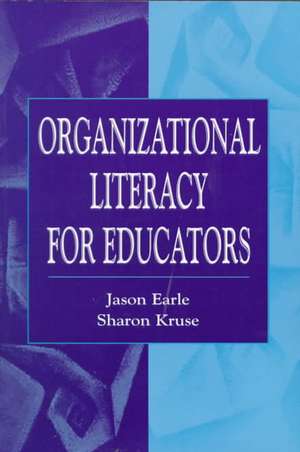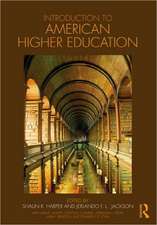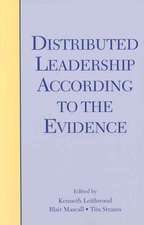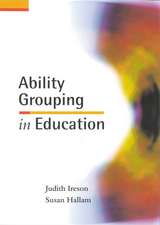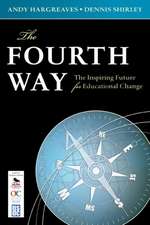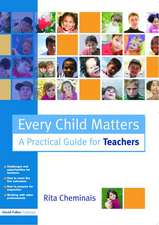Organizational Literacy for Educators
Autor Jason Earle, Sharon D. Kruseen Limba Engleză Paperback – feb 1999
Assuming little prior knowledge of theories about school organizations, this volume is intended as a text for introductory graduate courses, as well as for advanced undergraduate courses, and groups such as site-based management teams and district professional development committees.
| Toate formatele și edițiile | Preț | Express |
|---|---|---|
| Paperback (1) | 355.20 lei 43-57 zile | |
| Taylor & Francis – feb 1999 | 355.20 lei 43-57 zile | |
| Hardback (1) | 680.73 lei 43-57 zile | |
| Taylor & Francis – 27 iul 2017 | 680.73 lei 43-57 zile |
Preț: 355.20 lei
Nou
Puncte Express: 533
Preț estimativ în valută:
67.98€ • 70.78$ • 57.45£
67.98€ • 70.78$ • 57.45£
Carte tipărită la comandă
Livrare economică 10-24 martie
Preluare comenzi: 021 569.72.76
Specificații
ISBN-13: 9780805826395
ISBN-10: 0805826394
Pagini: 270
Dimensiuni: 152 x 229 x 15 mm
Greutate: 0.43 kg
Ediția:New.
Editura: Taylor & Francis
Colecția Routledge
Locul publicării:Oxford, United Kingdom
ISBN-10: 0805826394
Pagini: 270
Dimensiuni: 152 x 229 x 15 mm
Greutate: 0.43 kg
Ediția:New.
Editura: Taylor & Francis
Colecția Routledge
Locul publicării:Oxford, United Kingdom
Public țintă
ProfessionalCuprins
Contents: Preface. Organizational Literacy and Social Patterns. Bureaucratic Social Patterns and Schools. Political Social Patterns and Schools. Communal Social Patterns and Schools. Patterns of Inequality: Earlier Critical Approaches to Schooling. Patterns of Inequality: More Recent Critical Approaches to Schooling. Patterns of Inequality: Feminist Approaches to Schooling. Complexity and School Organizations. Cases for Analysis.
Recenzii
"This book has many strengths worth noting.....Earle and Kruse's writing style is a strength in that they are able to present very dense material in a clear and coherent manner....each chapter offers vignettes....at the end of each chapter is a tightly written summary, a practice case study, related exercies, a section entitled Reading Your Own School, and a recommended readings list....This book could...be used in conjunction with school and/or district-wide change and restructuring initiatives and for staff development purposes. Regardless of position (e.g., student, teacher, administrator, professor), this is a book worth securing for your library."
—The British Journal of Educational Psychology
"This excellent text is applicable beyond the confines of education and is most appropriate for junior and senior undergraduates in education, educational administration, and management classes and in introductory graduate courses in education, educational administration, and school counseling."
—CHOICE
"At the edge of the envelope in thinking in its field....Exceptionally well-grounded in current, relevant theory and research....If education in the United States cannot successfully counteract political efforts to standardize it, by re-establishing the legitimacy and desirability of giving emphasis to fairness, equity, equality of opportunity, and individualization of treatment, we shall surely lose whatever recognition we may have deserved for establishing a noteworthy system of public schools. This book promises to encourage and help people to think productively about these kinds of issues and concerns."
—George Crawford
University of Kansas
—The British Journal of Educational Psychology
"This excellent text is applicable beyond the confines of education and is most appropriate for junior and senior undergraduates in education, educational administration, and management classes and in introductory graduate courses in education, educational administration, and school counseling."
—CHOICE
"At the edge of the envelope in thinking in its field....Exceptionally well-grounded in current, relevant theory and research....If education in the United States cannot successfully counteract political efforts to standardize it, by re-establishing the legitimacy and desirability of giving emphasis to fairness, equity, equality of opportunity, and individualization of treatment, we shall surely lose whatever recognition we may have deserved for establishing a noteworthy system of public schools. This book promises to encourage and help people to think productively about these kinds of issues and concerns."
—George Crawford
University of Kansas
Descriere
Helps educators develop the knowledge and skills they need for reading and interpreting the patterns that constitute the social texts of everyday life in school organizations, thus becoming empowered to initiate effective schoolwide change efforts.
